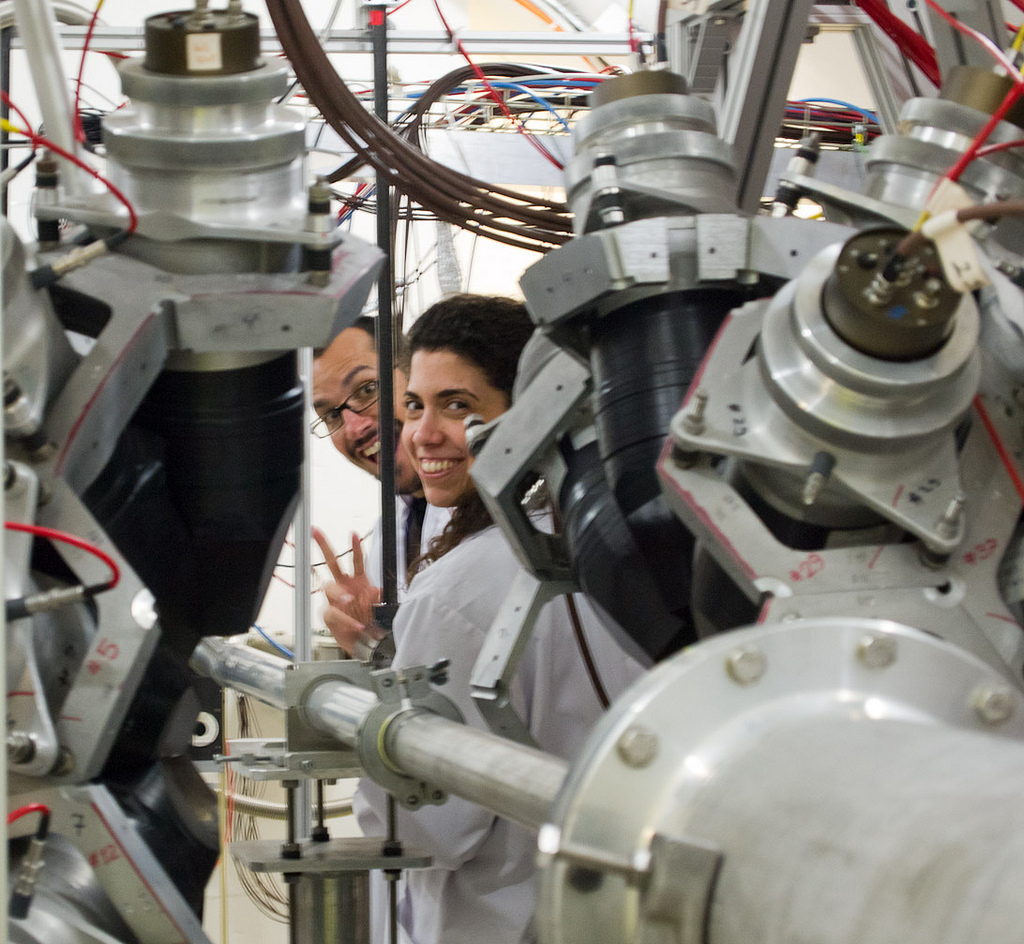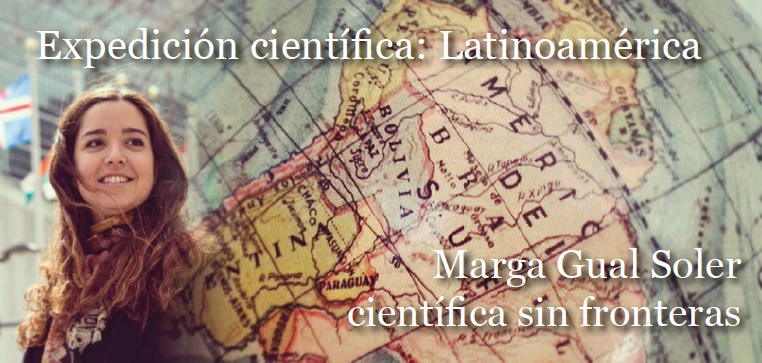An interview with Marga Gual Soler, new coordinator of the division for Latin America and the Caribbean of the World Association of Young Scientists. The launch was announced during the World Science Forum 2013 in Rio de Janeiro. Interview by: Bruno Geller /Agencia CyTA
 |
1 – Could you describe the projects undertaken by the World Association of Young Scientists to ensure the voices of youth and women in science are heard and why that’s important?
Young scientists today have a dual role: on the one hand, they will lead the scientific transformations of the future when becoming senior researchers, and on the other hand they represent the model for inspiring scientific vocations among younger generations. We believe in empowering young scientists to become visible and positive role models to break stereotypes -and show that scientists can be “cool”, too! Our objectives are: to analyze and diagnose the situation of young scientists around the world, to help them advance their careers – both inside and outside academia-, and to provide a collective voice for their adequate representation in society and in decision-making mechanisms. WAYS offers networks of support for young scientists at the most sensitive stages of their careers, which are the doctoral and postdoctoral periods. The situation of young women in science is worsened by the existence of a glass ceiling that hinders their rise to positions of responsibility, the negative stereotypes associated with the scientific profession, and the work-life imbalance.
2 – Which are the needs and challenges you observed that prompted the launch of a Latin American division of WAYS (WAYS LAC)?
In many developed economies, it is estimated that less than 20% of new doctors will continue their scientific careers within the academic system, creating the well-known “bottleneck effect”. But there is not enough data from LAC countries to pinpoint what the specific challenges are for early career scientists, some might be similar, but they might as well face problems of a very different nature. In recent years we have learned about many new grassroots initiatives promoted by young scientists with the common goal of raising the institutional and societal status of science in Latin America, besides advancing their own careers. WAYS invited some of these organizations to present their work during the last World Science Forum in Rio de Janeiro, and soon we realized that a new platform-umbrella was necessary to connect them with each other and help them achieve greater impact and regional cohesion. Furthermore, WAYS LAC will aim not only to articulate these organizations, but help them build a collective voice to adequately represent the ideas, challenges and specific recommendations of Latin American young science to decision-makers, society and the international community. We already have organizations interested in Argentina, Brazil, Uruguay, Perú, Chile, Ecuador, Panamá, México and Spain.
3 – What activities are you planning to do to support young researchers?
We want to coordinate our efforts with the recently appointed UN Special Envoy for Youth to encourage the participation of young scientists in discussions about the role of science in achieving sustainable development. In line with the United Nations Post+2015 Agenda, the dialogue among all stakeholders will be very important to define the future of science as a discipline and profession, and we want to ensure youth voices are not left out of the conversation. We will offer courses for the communication and transfer of scientific skills and capabilities to other fields such as communication, industry and policy-making. The benefits of placing PhD graduates in other fields are mutual, we believe all disciplines should take advantage of the overproduction of PhDs to incorporate scientifically-literate individuals in their workforce. We also plan annual meetings, workshops and tailored mentoring programs for empowering youth, women and minorities, in Spanish and Portuguese. Right now the language barrier is an obstacle for accessing information, as the vast majority of resources are in English. Finally, we want to strengthen science diplomacy initiatives to support the mobility of early career researchers in the LAC region, as some countries face an overproduction of PhD’s, while others need to import them, but we will first conduct research to obtain an accurate snapshot of the situation.
4 – Could you comment on what your job consisted at the UN to investigate and bring the voices of civil society on science, technology and innovation to set properties on the public policy agendas?
I supported the Economic and Social Council (ECOSOC) of the United Nations (UN), which is the main forum for discussion of economic, social and environmental issues. The ECOSOC theme for 2013 theme was “Science, Technology, Innovation and Culture for Sustainable Development and achieving the Millennium Development Goals.” My research consisted of collecting the concerns, challenges and policy recommendations of the 3,800 NGOs that have consultative status with ECOSOC, among whom are many universities and research centers around the world. It is important to give a voice to civil society in making decisions, and I think it is essential for scientists to be aware of the results and impact of our work from all perspectives. I documented my experience in Science Careers and since then I have received dozens of messages from young scientists from around the world who want to get involved in decision-making but do not know where to start. I believe WAYS is the ideal platform to provide them with the necessary guidance to make the leap.
5 – Are governments aware of the importance of science? Why do you think there is still distance between scientists, policy-makers and society?
Some countries realized a long time ago the need to incorporate scientists to all fields in order to bridge the gap between science and society. For example , the American Association for Advancement of Science (AAAS) has been placing PhD’s in politics, national and international organizations and media outlets for over 50 years. The objective of these programs is to train young scientists to succeed in other disciplines and advocate for science to a non-specialist audience. Recently, similar initiatives have emerged in Latin America. In Chile, Fundacion Mas Ciencia has done excellent work advocating for greater institutionality for science in the country, culminating with the recent announcement of the creation of a Ministry of Science and Technology. Other countries like Argentina already have a Ministry, and although there has been a significant increase in infrastructure and human resources, there is still an underlying problem: the lack of job opportunities for new doctors, reflected in the high rate of rejections of postdoctoral fellowships, according to Dr. Federico Vasen, a science policy specialist at the University of Buenos Aires. We want WAYS LAC to be a platform to share best practices and promote new programs similar to the AAAS fellowships.
6 – Public dissemination of science is essential to create bridges among stakeholders, but do you think scientists in general are somewhat isolated Are there innovative projects of scientists involved in public understanding of science in Spanish?
Indeed, many scientists still believe that communication and advocacy should be done by others. But this view is now changing, because the importance of science dissemination to the general public is being increasingly recognized at the institutional level and required by some countries (like Brazil and the United States) to secure research grants. In Spain there is a new science communication phenomenon called The Big Van Theory: a company of young scientists formed as a spin-off of international competition FameLab that are touring schools, theaters, bars and museums bringing science and entertainment to all corners of Spain. Now they are making the leap to Latin America to inspire young people with their innovative methods of science popularization, and this is one of the projects that WAYS LAC will be supporting.
7 – What do you think about citizens’ access to science in general, and about their level of interest?
We should not underestimate the importance of social networks as new channels for science dissemination, especially to reach the younger generations, as 90% of young people get their daily information through social media. If we do not use the appropriate channels, our message will never find its intended audience, or even worse, social networks will fill with pseudoscience. This is a niche we, as scientists, should be occupying. Many “celebrity scientists” such as Neil de Grasse Tyson” and institutions like NASA have made great impact worldwide through Twitter, and the Facebook page called I Fucking Love Science has more than 9 million followers. During my tour around Latin America I found that many scientists are unaware of how to use these tools professionally, but showed great interest in learning to help their work reach broader audiences.
Photo credit: Paco GT via Flickr
Marga Gual Soler is a biologist and PhD graduate in Cellular and Molecular Biology from Spain. She has collaborated with international NGOs working on education and scientific literacy and trained at the United Nations researching mechanisms of science diplomacy from a civil society perspective. Marga coordinates the new Latin American Network of Young Scientists (WAYS LAC) under the auspices of UNESCO and the Latin American Board of Georgetown University in Washington DC. WAYS LAC is currently seeking partners and sponsors, please contact Marga at marga.gualsoler [ ] gmail.com or via Twitter.
 |
